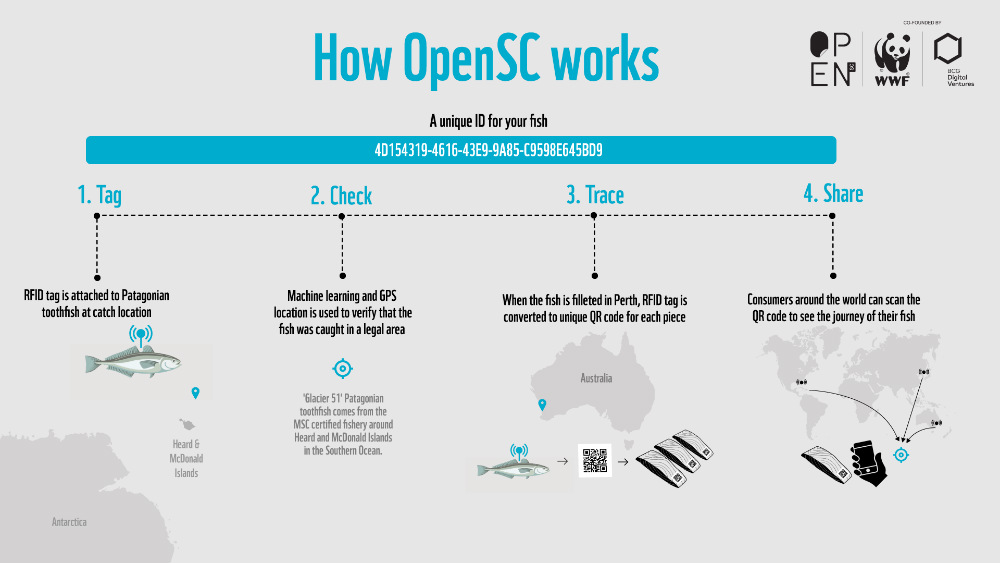In an innovative partnership, WWF-Australia and BCG Digital Ventures have launched a revolutionary new online platform called OpenSC that uses blockchain to track food and help people to avoid illegal, environmentally-damaging or unethical products. As WWF-Australia’s first social impact venture, OpenSC recently raised over US$4 million in capital. We are currently working to increase visibility and transparency in supply chains with household names like Nestle. Find out how you can build new business models with WWF’s unique blend of Panda Labs innovation methodology and sustainability expertise.
How OpenSC works
OpenSC enables businesses to track their products - anything from food to tissue paper - by assigning a unique ID to an individual product at its point of origin, such as the moment a fish is caught at sea.
The blockchain is a digital ledger that cannot be tampered with. It can store a range of data, such as:
- when, where and how the product was produced,
- when and how it moved from origin to the consumer,
- plus information about its social or environmental credentials
Consumers can also use OpenSC to learn more about the products they purchase. A simple example of the product in action is wild-caught Patagonian toothfish. By simply scanning a product QR code with their smartphone camera, OpenSC will show where the fish in front of them was caught, how it journeyed along the supply chain, and importantly - that it comes from a certified sustainable fishery and was not caught inside an established marine protected area.

More sustainable supply chains
Growing numbers of consumers prefer to buy products that are sustainable and ethical. Increasingly, consumer purchasing decisions reflect their social and environmental concerns, as well as price and quality.
When it comes to the fishing industry, OpenSC is already able to verify whether fishing occurs in legal waters. For example, working with Austral Fisheries, OpenSC has traced their ‘Glacier 51’ Patagonian toothfish from the point of catch in Antarctic waters through to final customers in Asia, Europe and the Americas, using a combination of vessel monitoring data, machine learning software, the Internet of Things (IoT) and blockchain technology.
On top of the existing MSC sustainability certification of the overall fishery, OpenSC provides a specific, data-backed assurance to consumer that their fish has not been caught illegally in an established marine protected area.
Good for business
OpenSC is driven by the conviction that what is good for the planet and humanity, should be good for business. Improved supply chain traceability and transparency technology unlocks a wealth of benefits for businesses committed to more sustainable and ethical approaches.
By using OpenSC, consumers can also be confident about what they are eating, where it came from, and how it got to them. Businesses can share the journey of their products with their customers through engaging digital experiences in restaurants, supermarkets and online.
As a transparency platform, OpenSC will enable more responsible and ethical consumption, so that businesses and consumers alike can verify, trace and share data on the sustainability of their products.
Click here to learn more about OpenSC